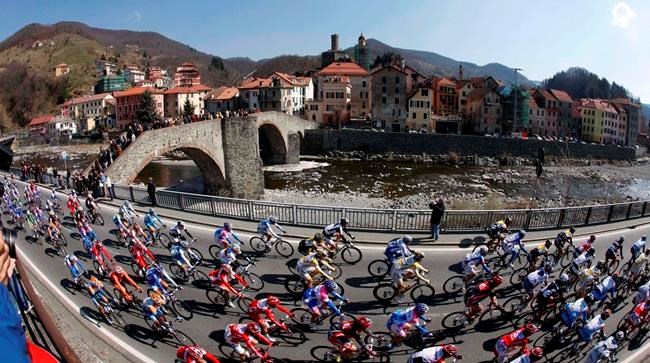BANGKOK — The global march of the new virus triggered a vigorous appeal from the World Health Organization for governments to pull out “all the stops” to slow the epidemic, as it drained
As China, after arduous weeks, appeared to be winning its epic, costly battle against the coronavirus, the fight was revving up in newly affected areas of the globe, unleashing disruptions that profoundly impacted billions of people.
The U.N. health agency urged all countries to “push this virus back,” a call to action reinforced by dramatic surges in new cases. The virus has infected 98,000 people and killed over 3,300.
“This is not a drill. This is not the time for giving up. This is not a time for excuses. This is a time for pulling out all the stops,” WHO Director-General Tedros Adhanom Ghebreyesus said in Geneva. "Countries have been planning for scenarios like this for decades. Now is the time to act on those plans."
As Chinese manufacturers gradually reopened their factories, anti-virus barriers went up elsewhere.
In Italy, the epicenter of Europe's outbreak, workers in latex gloves pinned “closed” notices on school gates, enforcing a 10-day shutdown of the education system. Italy's sports-mad fans are also barred from stadiums until April 3.
A government decree urged the country's famously demonstrative citizens to stay at least 1
That directive appeared to be widely ignored, as school closures left many Italian children in the care of their grandparents. Parks in Rome overflowed with young and old, undercutting attempts to shield older Italians from the virus that has proven riskier with age. Italy has the world’s second-oldest population after Japan.
“It’s an absolute paradox!” said Mauro Benedetti, a 73-year-old retiree called upon to watch his grandson. “They tell us to stay home. How can we help our kids and grandkids at the same time?"
“Grandparents are now at risk,” he said.
Italy's death toll climbed Thursday to 148, and its confirmed cases to 3,858, third behind South Korea and China, where the virus was first detected in December.
Iran, which has registered 107 deaths from COVID-19, also closed schools and universities and introduced checkpoints to limit travel between major cities. Iranians were urged to reduce their use of paper money. Iranian state TV also reported that Hossein Sheikholeslam, a 68-year-old diplomat who was an adviser to Iran’s foreign minister, had died of the virus.
Amid the string of bad news, Iranian President Hassan Rouhani urged state television to offer “happier” programs to entertain those stuck at home.
Palestinian officials closed the storied Church of the Nativity in Bethlehem indefinitely, weeks ahead of the Easter holiday. And virus fears may dull India's vibrantly colorful spring festival of Holi. Prime Minister Narendra Modi and other leaders said they wouldn't attend Holi events and the Holi Moo Festival in New Delhi was
In the United States, where 12 have died from the virus, hundreds were placed in self-quarantines due to cases in a New York suburb. A suburban Seattle school district with 22,000 students will close for up to two weeks because of coronavirus concerns, and Seattle's highways were nearly vacant for Thursday's morning commute as large tech employers like Amazon encouraged employees to work from home.
In Seattle, health officials recommended that the elderly and people with weak immune systems not attend games after an employee at the 72,000-seat football stadium tested positive for the coronavirus.
Off the coast of California, a cruise ship carrying about 3,500 people was ordered to stay put until passengers and crew could be tested because a
Financial markets remained volatile, as investors continued to weigh the size of the epidemic's dent on the global economy. Outbreak fears led to a sharp U.S. stock selloff, with the Dow Jones Industrial Average falling 969 points, or 3.6%, nearly wiping out gains from a day earlier. Analysts said more yo-yo moves on global markets are likely.
OPEC called for a deep production cut to keep crude oil prices from falling further as business disruptions globally slash demand from air travel and industry — deciding Thursday to push for a cut of 1.5 million barrels a day, or about 1.5% of total world supply.
As
Australia, Indonesia, and the United Arab Emirates banned entry of
Germany’s Lufthansa and its subsidiaries Austrian Airlines and Swiss warned of flight cancellations to and from Israel after it announced tough restrictions on
As the impact deepened globally, China is releasing more and more patients from the virus-dedicated hospitals it hastily built at the peak of its crisis. It has released 53,726 people who were declared cured, while about 6,000 virus patients are still hospitalized in serious condition.
On Friday, China reported 143 new cases of infection and 30 new deaths, almost all in the epicenter of Wuhan and surrounding Hubei province. That brings China's totals to 3,042 deaths and 80,552 cases, more than 80% of the world's cases.
___
Sedensky is an AP National Writer. Leicester reported from Paris. Contributing to this report were Kim Tong-Hyung and Hyung-jin Kim in Seoul, South Korea; Mari Yamaguchi in Tokyo; Ken Moritsugu in Beijing; Aniruddha Ghosal and Ashok Sharma in New Delhi; Jon Gambrell in Dubai, United Arab Emirates; Nicole Winfield in Rome, Geir Moulson in Berlin; Stan Choe in New York; Jamey Keaten in Geneva; Elaine Ganley in Paris, and Danica Kirka in London.
___
The Associated Press receives support for health and science coverage from the Howard Hughes Medical Institute’s Department of Science Education. The AP is solely responsible for all content.
___
Follow AP coverage of the virus outbreak at https://apnews.com/VirusOutbreak and https://apnews.com/UnderstandingtheOutbreak
Matt Sedensky And John Leicester, The Associated Press


